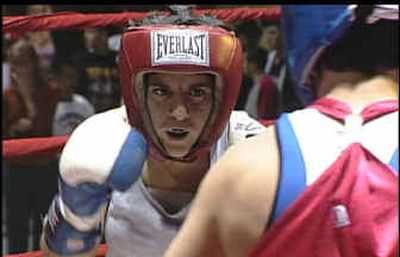Real life tragedy in ring

DENVER — It was the kind of blow that occurs thousands of times in boxing matches across the country: In the third round of a women’s bout against Heather Schmitz, Becky Zerlentes took a shot to the head above her left eye, then staggered forward and fell to the canvas.
Only this time, Zerlentes never regained consciousness and died, becoming the first female boxer to die in a sanctioned event.
The death stunned those who knew Zerlentes, a 34-year-old college instructor remembered as a fun-loving, adventurous person who had a particular fondness for sports.
“This is so much more than about boxing,” said Mary Croissant, who taught with Zerlentes at Front Range Community College. “She was the Energizer Bunny of our campus. She was turbo woman. She had a smile and a light in her heart that touched everyone she came in contact with. I miss her. I need her to still be alive.”
Zerlentes, who held a Ph.D in geography, rode her bike everywhere and chided those who wouldn’t drive to work together because it wasted energy. She organized group walks for the faculty, urging everyone to pick up trash along the way.
Zerlentes also had a brown belt in taekwondo and enjoyed boxing, which led her to compete in the Colorado Golden Gloves event on Saturday night. She died the next afternoon of what the coroner ruled blunt force trauma.
Although the number of female boxers is still relatively low — 2,200 are registered — interest in the sport has gradually increased since USA Boxing lifted its ban on women’s boxing in 1993. The success of boxers such as Muhammad Ali’s daughter, Laila, and the Academy Award-winning film “Million Dollar Baby” has put the sport more into the mainstream, as did the brief forays into the ring by B-list celebrities like former figure skater Tonya Harding and pinup model Mia St. John.
While women’s boxing isn’t likely to come close to reaching the status of the men’s side — the sport is a long shot to be added for the 2008 Beijing Olympics — any increase raises the chances that women are going to get hurt or killed in the ring.
“The USA Boxing family’s thoughts and prayers go out to Becky’s family and husband. We are deeply saddened by this loss,” said Sandy Martinez-Pino, president of USA Boxing, the national sanctioning body for amateur boxing.
The organization adheres to the same safety requirements for women as it does men: Boxers are required to go through pre- and postbout physicals and they must wear headgear. A certified doctor also must be ringside at every event and all bouts are tracked in a “passbook,” which records the outcome of the bout and the health of the athlete. Opponents are matched based on skill and experience in weight classes.
The last death at a USA Boxing event came in February 2001, when heavyweight Quinton Grier died of a heart ailment after a match. Juan Silva III was the last fighter to die as result of in-ring injuries in May 2000.
Overall, boxing ranks eighth in fatality rates for all sports — 1.3 deaths per 100,000 competitors, according to the Johns Hopkins Medical Institute.
It’s still unclear what happened to Zerlentes in her match against Heather Schmitz. Autopsy results are pending and Denver police said Tuesday no charges are likely. Not that it matters all that much to those who knew Zerlentes.
Married to Colorado State economics professor Stephan Weiler, she taught everything from economics to swimming at Front Range. An accomplished athlete, she had competed in triathlons, synchronized swimming, kickboxing and had a black belt in Goshin Jitsu, as well as brown belts in several other martial arts.
A regional Golden Gloves champion in 2002, she recently picked up the sport again, fighting out of Hard Knocks Boxing Gym in Milliken.
But again, her life was much more than what she accomplished in a classroom or in an arena. Acquaintances said she could turn around a bad day with a quick smile or hug.
She once agreed to attend a dinner for the school’s gay/straight alliance because it was a chance to meet people and wound up becoming an advocate for the group. She also was a guiding influence for Croissant, her colleague at the school.
“We’re like bewildered zombies walking around,” said Croissant, who knew Zerlentes for six years.